 Petzlover
Petzlover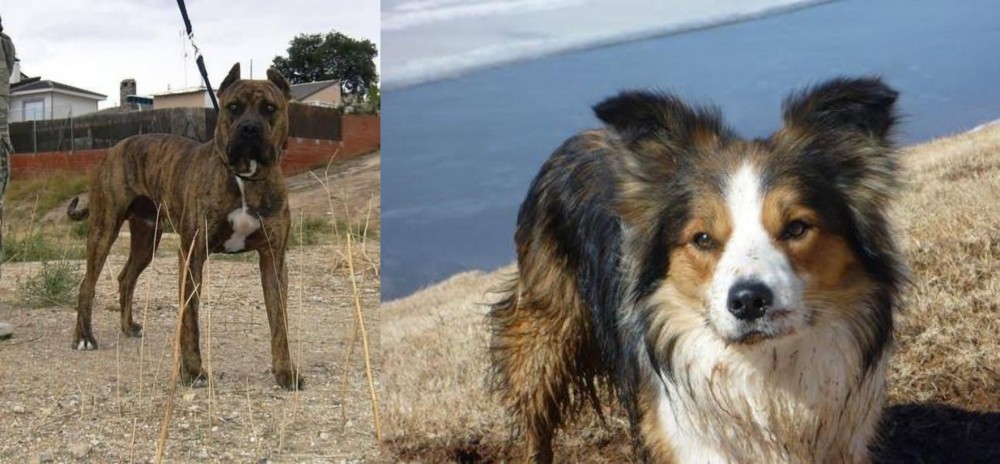 Perro de Toro is originated from Spain but Welsh Sheepdog is originated from United Kingdom. Perro de Toro may grow 8 cm / 4 inches higher than Welsh Sheepdog. Perro de Toro may weigh 15 kg / 34 pounds more than Welsh Sheepdog. Both Perro de Toro and Welsh Sheepdog has almost same life span. Both Perro de Toro and Welsh Sheepdog has almost same litter size. Both Perro de Toro and Welsh Sheepdog requires Low Maintenance.
Perro de Toro is originated from Spain but Welsh Sheepdog is originated from United Kingdom. Perro de Toro may grow 8 cm / 4 inches higher than Welsh Sheepdog. Perro de Toro may weigh 15 kg / 34 pounds more than Welsh Sheepdog. Both Perro de Toro and Welsh Sheepdog has almost same life span. Both Perro de Toro and Welsh Sheepdog has almost same litter size. Both Perro de Toro and Welsh Sheepdog requires Low Maintenance.
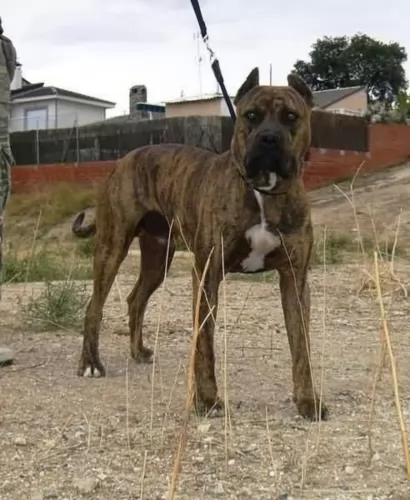 The rare Spanish Perro de Toro seems to have unclear origins, with some saying the dog is a direct descendant of the Toulouse Mastiff, while others say that the dog was developed by crossing the Alano with the Dogue de Bordeaux.
The rare Spanish Perro de Toro seems to have unclear origins, with some saying the dog is a direct descendant of the Toulouse Mastiff, while others say that the dog was developed by crossing the Alano with the Dogue de Bordeaux.
The dog hails from Spain and was once used as a fighting kind of dog but today it is essentially a family pet. The dog is an ancient breed, an ancestor of many of the molosser breeds that are around today.
 The Welsh Sheepdog is sometimes referred to as the Welsh Collie, but it is not a collie in anyway. It is the cross between the Border Collie and Welsh Sheepdog that is actually the Welsh Collie. The sheepdog was bred for herding not appearance and they are not all consistent in looks and size. They are a collie type but do not have recent collie ancestors. In fact the Border Collie has basically replaced the Welsh Sheepdog in herding sheep in Wales. The Welsh Sheepdog is still being bred as an indigenous breed. They are still prized for their ability to work independently and herding cattle, pigs, horses and goats as well as sheep. They were originally drovers.
The Welsh Sheepdog is sometimes referred to as the Welsh Collie, but it is not a collie in anyway. It is the cross between the Border Collie and Welsh Sheepdog that is actually the Welsh Collie. The sheepdog was bred for herding not appearance and they are not all consistent in looks and size. They are a collie type but do not have recent collie ancestors. In fact the Border Collie has basically replaced the Welsh Sheepdog in herding sheep in Wales. The Welsh Sheepdog is still being bred as an indigenous breed. They are still prized for their ability to work independently and herding cattle, pigs, horses and goats as well as sheep. They were originally drovers.
In the 18th century there were many different Welsh herding dogs and one drover might have 4-6 different types of sheepdogs as guard dogs, herders and hunters. Most of these breeds were taller than the Welsh Sheepdog. By 1940 there aere only a couple of breeds doing these jobs in Wales. The purebred Welsh Hillman and Black and Tan Sheepdog were on the verge of extinction at that point.
At that time the most common dogs were descendants of the Black and Tan Sheepdog and the Border Collie. The Welsh Sheepdog was still working in central Wales and in the north country. They were purely a working breed and not a show breed in any way. They remain that today.
They are a landrace and very rare today. They have been around for more than 800 years with no effort at standardization for this working dog. They are only registered with the WSS or Welsh Sheepdog Society and the DRA Dog Registry of America.
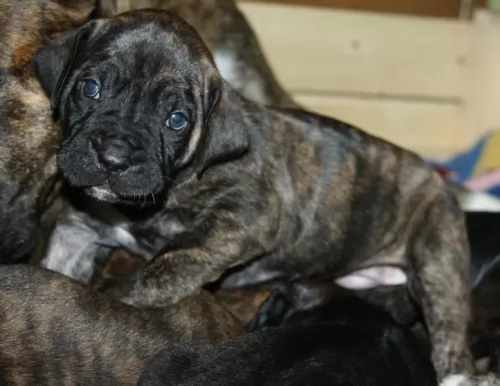 This is a strong, powerful, large breed of dog, making a good watchdog and guardian. He can be anything from 56 to 64cm in height and weigh between 34 and 40kg.
This is a strong, powerful, large breed of dog, making a good watchdog and guardian. He can be anything from 56 to 64cm in height and weigh between 34 and 40kg.
The nose of the dog is broad and black, the ears are set high and droop over slightly,making them floppy ears, but they have always been cropped to stand up erect.
He's a sturdy dog and the tail is fairly thick at the base, tapering to a point. These days it tends to be undocked and left long. The neck is strong and powerful too and the head brachycephalic. The short coat includes colors such as yellow, grey, fawn and red with the black mask.
The Spanish Bulldog looks fairly intimidating and he will certainly need training and socialization if he is to be obedient and well behaved.
He isn’t aggressive but is confident, dominant, fearless, loyal and also loving towards his owner. He is devoted towards his human family and is good with children. Like any mastiff type breed, he will need a firm, kind, consistent, patient owner. This is the kind of owner who will understand this breed type and take time out with him to exercise him and provide him with mental and physical stimulation so as to prevent boredom.
 Bred for their herding abilities not their appearance, the Welsh Sheepdog can vary in color, build and size. They have long legs, broad chests and wide muzzles. They are all around bigger than the Border Collie. They come in black and white, tricolor, red and white and merle. The coat can be short or long and the ears pricked and folded at the top.
Bred for their herding abilities not their appearance, the Welsh Sheepdog can vary in color, build and size. They have long legs, broad chests and wide muzzles. They are all around bigger than the Border Collie. They come in black and white, tricolor, red and white and merle. The coat can be short or long and the ears pricked and folded at the top.
They look most like the Border Collie with a taller, broader, more solid build. They typically are stronger than the Border. Their head is distinctly collie shaped, flat and broad with the wide muzzle. The nose is black and the eyes are oval and brown. The merles can have striking blue eyes.
This is an athletic dog and you can tell by looking at her. Well muscled, broad back and neck with a long upward tail. Their tough paws are perfect for the rough terrain and Wales mountainsides.
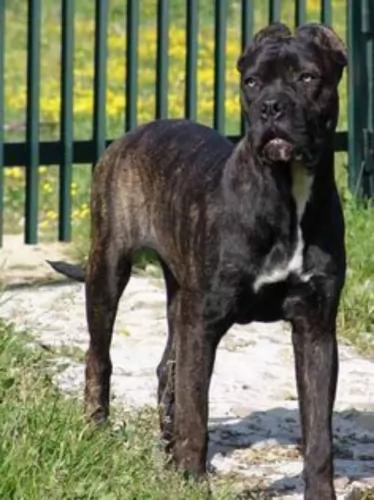 Contrary to what many people think, the temperament of the Perro de Toro is calm and well balanced. This is a reliable, loving, loyal dog who wants to protect his human family.
Contrary to what many people think, the temperament of the Perro de Toro is calm and well balanced. This is a reliable, loving, loyal dog who wants to protect his human family.
He gets on well with children and with pets in the home and when trained and socialized, this intelligent dog is well mannered, obedient and sometimes even submissive.
True, the Perro de Toro has a history of being involved in all kinds of things, from hunting to fighting and also being a working dog, but he is now waiting to show you what a splendid pet he can be if he is raised by the right kind of people.
 1Children friendliness not really – aloof and concerned with job- all this dog wants to do is work.
1Children friendliness not really – aloof and concerned with job- all this dog wants to do is work.
3.Adaptability – Not an inside dog in any way. They need several hours of exercise per day.
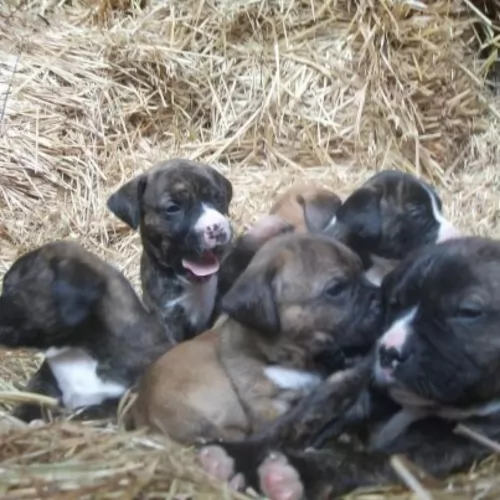 This is a dog breed that is fit and healthy, but to keep him that way you want to make sure he has enough exercise, love and nutritious food.
This is a dog breed that is fit and healthy, but to keep him that way you want to make sure he has enough exercise, love and nutritious food.
He is not known to suffer from any particular disease, but even so, it is wise to be aware of some of the common dog illnesses that your dog could pick up so you can get veterinary help for him just as soon as possible.
With cancer, cells grow rapidly and invade tissue. Dogs can get any of the many cancers there are. Both hereditary and environmental factors can contribute to the development of cancer in canines. Cancer can show up as lumps, swelling, sores that won’t heal, weight loss and difficulty with breathing.
Heartworms are transmitted from one animal to the next by mosquitoes. These worms live in the heart and pulmonary arteries of an infected animal, travelling through the bloodstream and causing havoc. Heartworm is dangerous and can actually be life threatening. Symptoms include coughing, vomiting, battling to breathe and weight loss.
This is a viral disease that can strike terror in anybody who has seen an animal with rabies. It affects the brain and spinal cord of your dog. It is preventable through means of a vaccine. Once symptoms appear, it is a disease which is nearly always fatal.
 Usually an indigenous rare breed does not have a lot of genetic or hereditary health concerns. This is a little different with the Welsh Sheepdog can suffer from any of these conditions.
Usually an indigenous rare breed does not have a lot of genetic or hereditary health concerns. This is a little different with the Welsh Sheepdog can suffer from any of these conditions.
• Epilepsy – Most respond well to medication and others might not even need medication.
• Collie Eye Anomaly – This is common in collie breeds like the rough coated collie. The development of the Choroid is impaired resulting in harm to the circulation of blood to the eye.
• Atopic Dermatitis – Allergic skin disorder irritating paws, ears, and perineum.
• PRA Progressive Retinal Atrophy - deterioration of the retina can lead to blindness. Inherited.
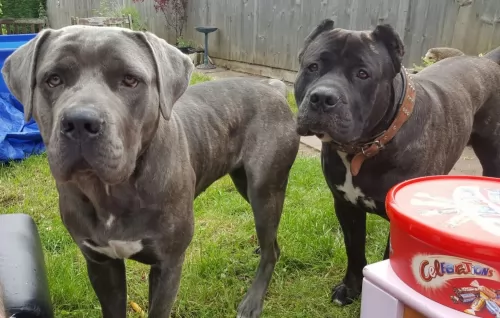 If they are not being used as working dogs, they are family pets, and you need to give them a lot of daily exercise. You will need to give him some walks or hikes and allow him a good run in the country.
If they are not being used as working dogs, they are family pets, and you need to give them a lot of daily exercise. You will need to give him some walks or hikes and allow him a good run in the country.
The Perro de Toro is a short haired dog, and as a moderate shedder, he isn’t going to require too much grooming. A brushing twice a week will help get rid of his hair.
When brushing him, turn it into a bit of a grooming session and check inside his ears, look at his eyes and try to look inside his mouth. He can’t tell you if he has terrible toothache from a rotting tooth and he will rely on you to check his teeth.
Mastiff type dogs need a wholesome diet to remain strong and active. If you are going to feed your pet one of the commercially manufactured dog foods, make sure it is one of the top quality ones.
Avoid the ones that use lots of colorants, preservatives and unhealthy fillers as these can make your dog sick. Try and give him some home-made food which can be added into his dry kibble occasionally.
Boiled chicken, brown rice or pasta and some vegetables such as carrots, sweet potato and spinach chopped up will be excellent for him and will ensure he doesn’t battle with digestive upsets. If you can, every now and then try to include some raw meat for the benefit and health of your pet. Never leave him without a bowl of fresh, cool water.
 1Feeding the puppy active dog feed high quality high protein food. 3-4 x day 1-2 cups
1Feeding the puppy active dog feed high quality high protein food. 3-4 x day 1-2 cups
2.Feeding the adult Active dog feed high quality high protein 2x day 2 cups a day.
4. Games and Exercises This is an extremely active breed that needs a job. They are not the best pets they are working dogs. They need a lot of exercise. They are not good at living indoors. At least 2 hours of exercise daily is a must.